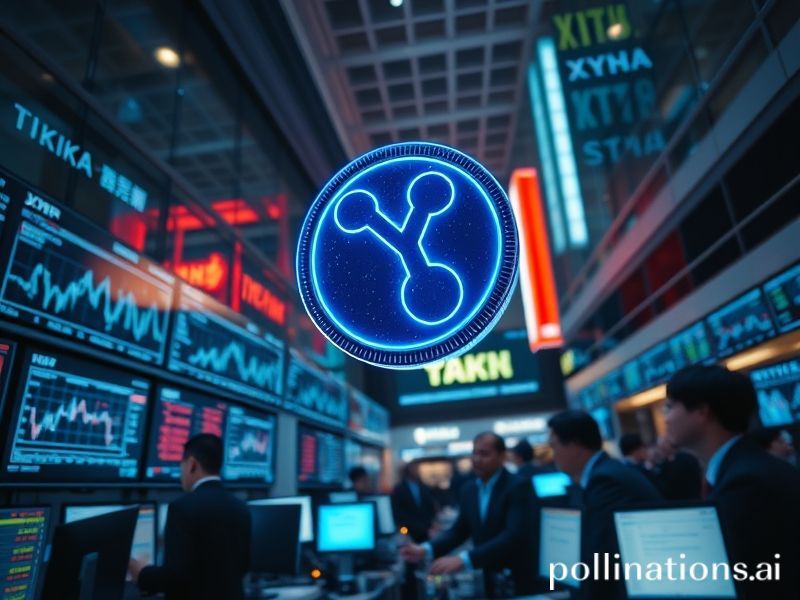XRP Drama Goes Global: How a Swiss Cow Town and a New York Courtroom Are Quietly Deciding the Future of Money Transfers
Zug, Switzerland – where the cows outnumber the regulators and every fondue pot doubles as a shell company – has once again become the unlikely stage for the world’s longest-running crypto-soap opera: the XRP melodrama. Just when you thought the Ripple-SEC lawsuit had settled into the comfortable rhythm of a Scandinavian slow-TV train ride, the appellate court in New York decided to hit rewind. Cue dramatic music, preferably something that evokes both tango and tax evasion.
For the uninitiated (bless your still-hopeful hearts), XRP is the digital asset cheerfully described by its boosters as “the fastest, most scalable crypto on Earth” and by its detractors as “the fastest way to lose money since 2017.” Ripple, the San Francisco-based firm that owns roughly half the supply, insists XRP is merely a misunderstood bridge currency for cross-border payments – sort of like a polite Canadian who apologizes while quietly vacuuming up your liquidity. The U.S. Securities and Exchange Commission, meanwhile, contends that XRP is an unregistered security, or, in layman’s terms, a piñata stuffed with litigation risk.
The latest plot twist arrived last week when the Second Circuit granted the SEC’s appeal against Judge Analisa Torres’s July 2023 ruling, which had carved out an elegant-if-baffling distinction: XRP sold on exchanges to retail investors is not a security, but XRP sold to institutional chums in bespoke suits most definitely is. Legal scholars called the decision “Solomonic.” Everyone else called it “a jurisprudential mullet – business in the front, retail rave in the back.” Now that mullet is getting a regulatory perm.
Global implications? Oh, they abound like mosquitoes at a Davos after-party. Should the appellate court reverse Torres, American exchanges may once again scatter like teenagers caught vaping, delisting XRP faster than you can say “regulatory clarity.” That would leave the token’s liquidity increasingly reliant on Asia-Pacific venues – think Tokyo’s BitFlyer, Seoul’s Upbit, and Singapore’s affectionately nicknamed “Binance Lite: Now With Fewer Arrests.” For retail holders in Peoria or Preston, the takeaway is simple: your trades may soon carry the same jurisdictional thrill as ordering absinthe from a Moldovan IP address.
Yet the real action is macro. Central banks from Paris to Pretoria are watching the case like hawks on a Red Bull drip. A harsh ruling could embolden them to tighten the screws on all private tokens, accelerating their own CBDC projects – those state-issued digital coins that promise the efficiency of crypto without the embarrassment of having to explain it to your in-laws. Conversely, a Ripple victory would gift crypto lobbyists a rhetorical bazooka: “See? Even the Americans can’t decide what a security is. Let innovation roam free!” Cue champagne in Malta and panic in Brussels.
Meanwhile, emerging-market remittance corridors – Mexico, Philippines, Nigeria – are caught in the crossfire. Ripple has spent years courting local banks with the siren song of “2-second settlement, 0.0001 XRP fee,” which sounds great until your correspondent remembers that a single court filing can vaporize 20% of the bridge asset’s value before you can say “¡Hijo, envía más dólares!” For migrant workers, the choice remains poetic: Western Union’s eye-watering fees or crypto’s eye-watering volatility. Pick your poison; either way, someone’s yacht gets upgraded.
And so we wait. The appellate briefs aren’t due until autumn, giving both sides ample time to polish their arguments and their LinkedIn victory laps. In the interim, XRP will continue its usual pas de deux with Bitcoin – rising on rumor, sinking on subpoena, forever oscillating between revolutionary remittance tool and speculative pet rock. The rest of us, citizens of a planet increasingly run on vibes and litigation finance, can only pour another drink and marvel that the global monetary system now hinges on whether a judge thinks your magic internet beans smell like securities.
Cheers to the absurdity; may your stop-loss be tighter than the SEC’s discovery schedule.







